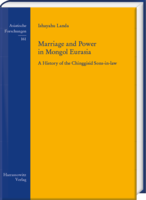|
|
more titles of the subject:
Download:
Please note: With adding digital Products to your cart
the payment will be handled via PayPal. The download will be provided after the payment is confirmed. Since the beginning of his rise to power, Chinggis Khan used matrimonial relations between the members of his family and his allies in order to strengthen his support base and to expand the potential of his army. Whereas research has discussed in detail the history of the Chinggisid women, the role of their male non-Chinggisid counterparts – the imperial sons-in-law (Mon. güregen, Ch. fuma 駙馬), mostly the powerful military commanders – is still an under-researched topic.
In his monograph, Ishayahu Landa for the first time provides a comprehensive and detailed discussion of the Chinggisid in-laws, approaching them as a separate political institution with its own status, privileges, and ambitions, which played a crucial role in underpinning the Mongol rule across the continent. The monograph is unique in its combined usage of Arabic, Persian, Chinese, Latin and Old Slavonic primary sources as well as its temporal scope, ranging from the early thirteenth century to the period of the Chinggisid Crisis and beyond. The monograph will be of interest for specialists in Mongol, Chinese, Islamic, Russian, and global histories, as well as in the field of Gender Studies, and nomadic history and ethnography. At the same time, it covers an important aspect of the power structure behind the Chinggisid expansion, its maintenance of power from Korea to the Black Sea, as well as its decline. |
|||||||||||||||||||||||||||||||||||||||






